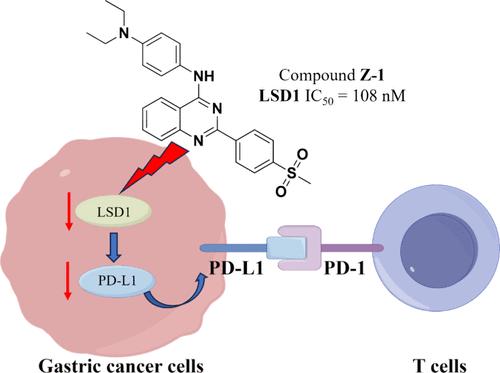当前位置:
X-MOL 学术
›
J. Med. Chem.
›
论文详情
Our official English website, www.x-mol.net, welcomes your
feedback! (Note: you will need to create a separate account there.)
Discovery of 2-Aryl-4-aminoquinazolin-Based LSD1 Inhibitors to Activate Immune Response in Gastric Cancer
Journal of Medicinal Chemistry ( IF 6.8 ) Pub Date : 2024-09-12 , DOI: 10.1021/acs.jmedchem.4c00972 Bo Wang 1 , Shu-Wu Wang 1 , Ying Zhou 1 , Shao-Peng Wang 1 , Ya Gao 1 , Hui-Min Liu 1 , Shi-Kun Ji 1 , Sai-Qi Wang 2 , Yi-Chao Zheng 1 , Cheng Zhang 3 , Adil Mardinoglu 3, 4 , Hong-Min Liu 1 , Xiao-Bing Chen 2 , Xing-Jie Dai 1
Journal of Medicinal Chemistry ( IF 6.8 ) Pub Date : 2024-09-12 , DOI: 10.1021/acs.jmedchem.4c00972 Bo Wang 1 , Shu-Wu Wang 1 , Ying Zhou 1 , Shao-Peng Wang 1 , Ya Gao 1 , Hui-Min Liu 1 , Shi-Kun Ji 1 , Sai-Qi Wang 2 , Yi-Chao Zheng 1 , Cheng Zhang 3 , Adil Mardinoglu 3, 4 , Hong-Min Liu 1 , Xiao-Bing Chen 2 , Xing-Jie Dai 1
Affiliation

|
LSD1 (histone lysine-specific demethylase 1) has been gradually disclosed to act as an immunomodulator to enhance antitumor immune response. Despite the identification of numerous potent LSD1 inhibitors, there remains a lack of LSD1 inhibitors approved for marketing. Novel LSD1 inhibitors with different mechanisms are therefore needed. Herein, we reported a series of novel quinazoline-based LSD1 inhibitors. Among them, compound Z-1 exhibited the best LSD1 inhibitory activity (IC50 = 0.108 μM). Z-1 also acted as a selective and cellular active as an LSD1 inhibitor. Furthermore, Z-1 promoted response of gastric cancer cells to T-cell killing effect by decreasing PD-L1 expression and further attenuated the PD-1/PD-L1 interaction. In vivo, Z-1 exhibited significant suppression effect on the growth of gastric cancer cells without obvious toxicity. Therefore, Z-1 represents a potential novel immunomodulator that targets LSD1, providing a lead compound with new function mechanism for gastric cancer treatment.
中文翻译:

发现基于 2-芳基-4-氨基喹唑啉的 LSD1 抑制剂激活胃癌免疫反应
LSD1 (组蛋白赖氨酸特异性去甲基化酶 1) 已逐渐被揭示为一种免疫调节剂,可增强抗肿瘤免疫反应。尽管已鉴定出许多强效 LSD1 抑制剂,但仍缺乏获批上市的 LSD1 抑制剂。因此,需要具有不同机制的新型 LSD1 抑制剂。在此,我们报道了一系列基于喹唑啉的新型 LSD1 抑制剂。其中,化合物 Z-1 表现出最好的 LSD1 抑制活性 (IC50 = 0.108 μM)。Z-1 还作为 LSD1 抑制剂作为选择性和细胞活性。此外,Z-1 通过降低 PD-L1 表达促进胃癌细胞对 T 细胞杀伤作用的反应,并进一步减弱 PD-1/PD-L1 相互作用。在体内,Z-1 对胃癌细胞的生长表现出显着的抑制作用,无明显毒性。因此,Z-1 代表了一种靶向 LSD1 的潜在新型免疫调节剂,为胃癌治疗提供了具有新功能机制的先导化合物。
更新日期:2024-09-12
中文翻译:

发现基于 2-芳基-4-氨基喹唑啉的 LSD1 抑制剂激活胃癌免疫反应
LSD1 (组蛋白赖氨酸特异性去甲基化酶 1) 已逐渐被揭示为一种免疫调节剂,可增强抗肿瘤免疫反应。尽管已鉴定出许多强效 LSD1 抑制剂,但仍缺乏获批上市的 LSD1 抑制剂。因此,需要具有不同机制的新型 LSD1 抑制剂。在此,我们报道了一系列基于喹唑啉的新型 LSD1 抑制剂。其中,化合物 Z-1 表现出最好的 LSD1 抑制活性 (IC50 = 0.108 μM)。Z-1 还作为 LSD1 抑制剂作为选择性和细胞活性。此外,Z-1 通过降低 PD-L1 表达促进胃癌细胞对 T 细胞杀伤作用的反应,并进一步减弱 PD-1/PD-L1 相互作用。在体内,Z-1 对胃癌细胞的生长表现出显着的抑制作用,无明显毒性。因此,Z-1 代表了一种靶向 LSD1 的潜在新型免疫调节剂,为胃癌治疗提供了具有新功能机制的先导化合物。































 京公网安备 11010802027423号
京公网安备 11010802027423号